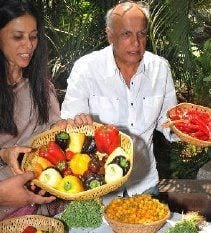The film launch drew a wide cross-section of Bangalore’s society. Among those who attended were MLAs, senior bureaucrats, former vice-chancellor of the agriculture university, agricultural officials, army officers, film stars, theatre personalities, senior editors, principals and teachers of city colleges and schools, general managers of hotel chains, NGOs and young students from colleges among other citizens. As witnessed in the previous launches, the film opened to a packed house and drew a loud round of applause. And it generated so much of concern that people clamored for multiple copies of the DVD for screening at various places. The Bangalore launch ceremony provided a peep into the rich vegetable biodiversity heritage that stands threatened by the introduction of GM crops. A beautiful splash of colorful vegetables, including four varieties of ladyfinger, twelve varieties of tomatoes, seven varieties of capsicum, three varieties of watermelon, six varieties of zucchinis, were displayed along with a spread of salads. Mahesh Bhatt was pleasantly surprised to see the colorful array of vegetables. “This seems to be from an unreal world,” he quipped. Sangita replied: “Sir, this is the real world. What you are currently living in is the unreal world. “ Bhatt confided that he had never seen such a wide diversity in vegetables. He wouldn’t believe that there could be purple capsicum and a variety of miniature capsicum in chocolate color. There were red chilies, more than half a feet long, that Mahesh Bhatt was intrigued to see. He thought they were painted. This variety is called Cayenne, very spicy and used in Mexican food. Annadana’s field team from Auroville had specially brought the vegetables for display, along with educational material. After the launch ceremony, the guests were treated to an organic splendor. Vegetables were brought from Auroville and Sangita’s farm. The rest of the ingredients like organic oil, cane sugar, rice, and ragi millet, called organic lifestyle products, were supported by Iskon. The Times of India news report below captures the essence. Reports have appeared in several newspapers but I have access to only this newspaper. I am therefore reproducing the report below. A day after the launch, the film was screened at a farmers event in Tumkur (Karnataka). The film is also being shown in the Sarosh Institute of Hotel Management, Mangalore on Tuesday, Mar 10. Says Krishna Prasad, director of Sahaja Samrudha: “This film has come as an important advocacy tool. We will take the message to the masses.” The Bangalore event also marked the launch of a My Right To Safe Food campaign. Mahesh Bhatt formally launched the campaign by releasing a booklet on My Right to Safe Food. It simplifies the complex and scientific issue for the man on the street, and also addresses some frequently asked questions. Also displayed were a set of posters on safe food and the hidden dangers of GM foods, what we would lose if we don’t raise our voice now. The packet with the booklet also contained a set of stickers, very striking and thought-provoking. If you are keen to get these stickers and put it on your car or elsewhere, write to myrighttosafefood@gmail.com Here is the TOI news report: Say no to GM food, for its poison: Bhatt Bangalore: The long-drawn debate on the commercialization of genetically modified food has intensified just as the government is set to hit the last nail in the coffin. Food policy analyst Devinder Sharma says genetically modified Bt Brinjal is likely to enter the market in May. Noted film-maker Mahesh Bhatt released his documentary `Poison on the platter’ and launched a My Right Safe Food campaign in the city on Saturday. The film looks at the history of GM food and its health impact in different parts of the world. In 1989, over 10,000 persons were disabled after L Tryptophan, a genetically modified drug was introduced in America. Most suffered memory loss, muscle weaknesses, leathery skin, and other symptoms. Studies attribute around 100 deaths to the epidemic. The movie also focuses on the impact on mice on which companies like Monsanto conducted tests. Most developed serious immunological problems and liver and kidney disorders. Ignorance about the technology is also highlighted in the form of vox pop interviews on the streets of various metros. Bhatt said: “This conspiracy is not possible without the tacit support of the watchdogs. The government needs to have a mother’s heart. It cannot feed unsafe food to citizens without their knowledge.” Kannada film-maker Nagathahalli Chandrashekhar said Karnataka, which is rich in biodiversity and native varieties of brinjal like Udupi Mattagulu, has a lot at stake. Director Ajay Kanchan said the technology is more dangerous than nuclear disasters and terror attacks. Portraying the inconvenient truth The movie features Sri Ravi Shankar of the Art of Living foundation. It discusses the consequences of the introduction of GM food and the people’s right to say no to it. Leading molecular biologist Pushpa Bhargava, who was appointed by the Supreme Court to advise the Genetic Engineering Approval Committee, talks in detail about loopholes in the approval process and faulty safety data submitted by MNCs.
